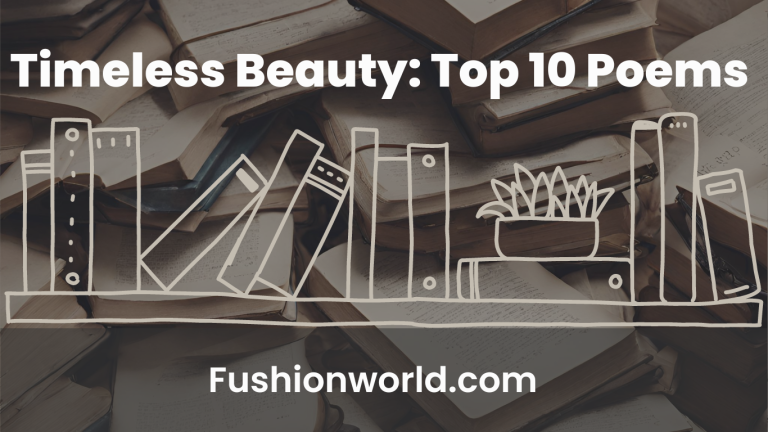Introduction
In the dynamic and technical world, though there are many scientific inventions to complete any hazardous work within a minute without much effort, there is no machinery that has ever been found to convey human emotions perfectly. Indeed, many online tools will assist you in writing poems or quotes to imitate what you feel, but in the end, it will not be satisfying because no machine can filter what is in your heart. Unlike these machines, poets and artists have created some timeless classics that will be remembered for their truth and beauty throughout their lifetime. They combined the complexities and elegance of human life and left an incredible mark on literature. Here, we are talking about Timeless Beauty: Top 10 Poems.
Poetry always has the power to present the essence of human emotions perfectly with words. Over the centuries, these poets have been remembered and celebrated for their words and thoughts. Let’s now see the top 10 poems of all time.
Here, we are talking about Timeless Beauty: Top 10 Poems:
The Raven: Edgar Allan Poe

Raven, by Edgar Alan Poe, begins with the poet worrying about losing his beloved Lenore. While he distracts himself by reading, he hears someone tapping on his door, only to see nothing but darkness. Suddenly, a raven flies into his room, and the poet gets curious and asks the raven many questions about the future and the possibility of being reunited with Lenore in the afterlife. But the raven’s only answer is “Nevermore,” which the poet interprets as his eternal grief and hopelessness.
The Waste Land: T.S. Eliot
The poem’s first line, “April is the cruelest month,” depicts a hopeless and disillusioned world. Eliot interweaves various voices in each section, referencing multiple myths and legends such as the Grail story, the Buddhist Fire Sermon, the Hindu Upanishads, and the Fisher King myth. The story discusses death, futility, lust, and the destructive power of water.
The Road Not Taken: Robert Frost
Robert Frost’s “The Road Not Taken” is a poem about choices and preferences. The poet says that he sees two roads before him: one is mainly taken, and the other is less traveled. This symbolically refers to the choices in life: one is conventional, and the other is an unconventional choice. The poet ends the poem by choosing the unconventional path, which is less traveled. This represents the bold decision of choosing what you like regardless of society’s ideas.
The Love Song of J. Alfred Prufrock: T.S. Eliot
“The Love Song of J. Alfred Prufrock” is a modernist poem by T.S. Eliot. The poet in this poem expresses his insecurities, hesitations, and rejections, especially regarding love and how society perceives him. It explores the themes of alienation and the challenges of forging meaningful connections in a changing world.
I Wandered Lonely as a Cloud: William Wordsworth
The poem begins by stating that he walks alone as the cloud floats in the sky. The speaker then witnesses the never-ending row of daffodils near the lake. The poet says that the daffodils surpass the beauty of waves. Eventually, after seeing this beauty, the poet goes into a reflective mood, gets inspired, and enjoys the moment of solitude.
The Raven: Samuel Taylor Coleridge
This poem begins with the old sailor, who stops the wedding guest to listen to his tale. He then narrates about his journey at sea and how he impulsively shoots an albatross. (An albatross is considered to be a good omen.) Due to his act, the ship stops in the sea, and the sailor gets blamed for this act. To rectify this, he has to wear the dead albatross around his neck. Eventually, all the other crew members die, and the sailor is only left alone. The moment he spiritually awakened, realized his mistakes and started to admire the beauty of nature, his curse was removed, and the ship started sailing. Consequently, the poet shares this story with everyone he meets to warn people about the consequences when they go against nature.
Ode to a Nightingale: John Keats
The poet begins the poem by praising the nightingale’s song and how it has been unchanged since biblical times and wonders about its immortal life, unlike humans, and how it is unaffected by human sufferings and wishes to escape reality as a nightingale. In closing, the speaker says goodbye to the nightingale, saying that not even their wildest dreams could have led them to believe they could take off with it. The speaker questions whether they heard the nightingale’s song or if it was all just a dream as the bird takes off.
Howl: Allen Ginsberg

Allen Ginsberg’s “Howl,” a famous poem from the Beat Generation, challenges social norms and explores the experiences of the disillusioned post-World War II generation. Its unadulterated, untainted language and powerful social commentary have cemented its reputation as a counterculture classic.
A Dream Within A Dream: Edgar Allan Poe

Edgar Allan Poe’s “A Dream Within a Dream” examines how fleeting reality and life are. The speaker compares her struggle with being unable to hold onto moments to grabbing handfuls of sand. The poem wonders if life is a dream inside a dream, casting doubt on the line that separates dreams from reality. Poe explores the ephemeral and fleeting facets of human existence in his writing.
Do not go gentle into that good night: Dylan Thomas
Dylan Thomas’s “Do Not Go Gentle into That Good Night” addresses several archetypes with this appeal, urging them all to “burn and rave at the close of the day” and reject a cowardly surrender to death. The poem ends with a direct appeal to the speaker’s father, which gives the overall theme of defiance a poignant touch.
FAQ
Who is the No. 1 English poet?
William Shakespeare is considered the most famous poet of all time.
Who is the father of English poetry?
Geoffrey Chaucer
Who is known as the poet of love?
Donne is considered a love poet. 4. Who is a world poet? Rabindranath Tagore is the world poet
How can someone appreciate and understand poetry better?
Appreciating poetry differs from person to person. As every person has different perspectives, the beauty of literature varies for each person.
Are there any contemporary poems that could be considered classics in the future?
Literature is not constant; it is continuously evolving. And so, there is always a possibility for contemporary poems to be included in classics in the future.
What is the most famous poem style?
Sonnets are the most famous poem style.
What are the most romantic poem styles?
Odes, lyrical ballads, and sonnets.
Who is the father of romantic poetry?
William Wordsworth is celebrated as the most romantic poet.
How do I write poetry?
Read a lot of poems. Express your ideas. Note it down and start writing small poetry first.
Do poems teach lessons?
Indeed, poetry is a powerful tool to shape human life and society.
Why read poetry?
Poetry is one of the versatile tools that can be used to vent out human emotions and shape society and oneself.
Is poetry a learned skill?
It depends from one person to another. While some may understand the poem or be able to write a poem in a single sitting, others may take a while.
Conclusion:
Each verse of these poems has captured the readers’ hearts for its beauty and elegance. All these poems are written in different styles, themes, and eras but still have stood apart for their truth and credibility. So what are you waiting for? Take a pen and write down your feelings so that all your worries will be vented out, creating your poetry.
Poetry is not celebrated for its feelings, but for the emotions and truth, the words carry. So read classics, poems, and literature to make your life better. Not always can one speak what is in their hearts and minds, but through poems, we can find ourselves and, at times, even lose ourselves. So, read poems and enjoy their little pleasure.

